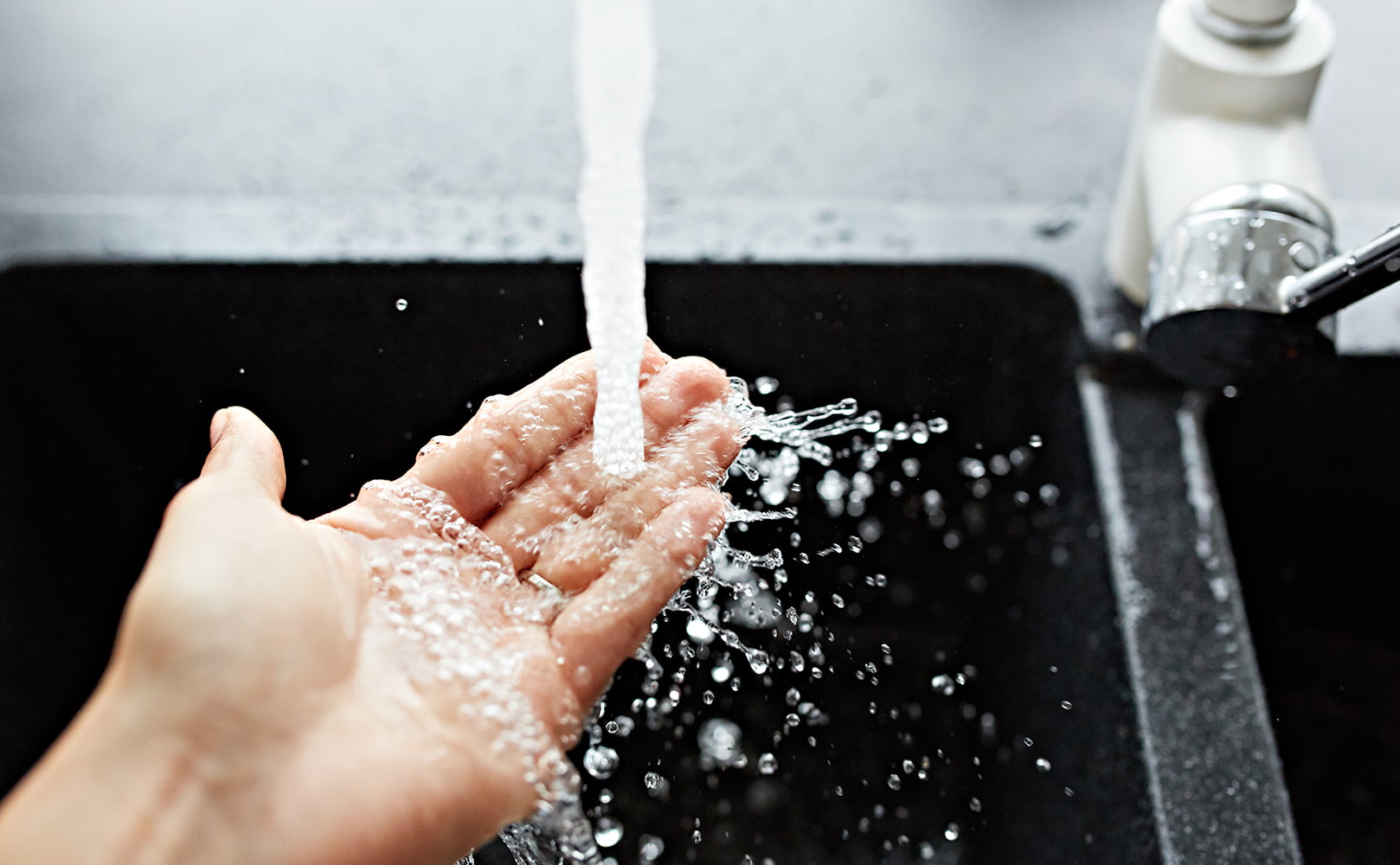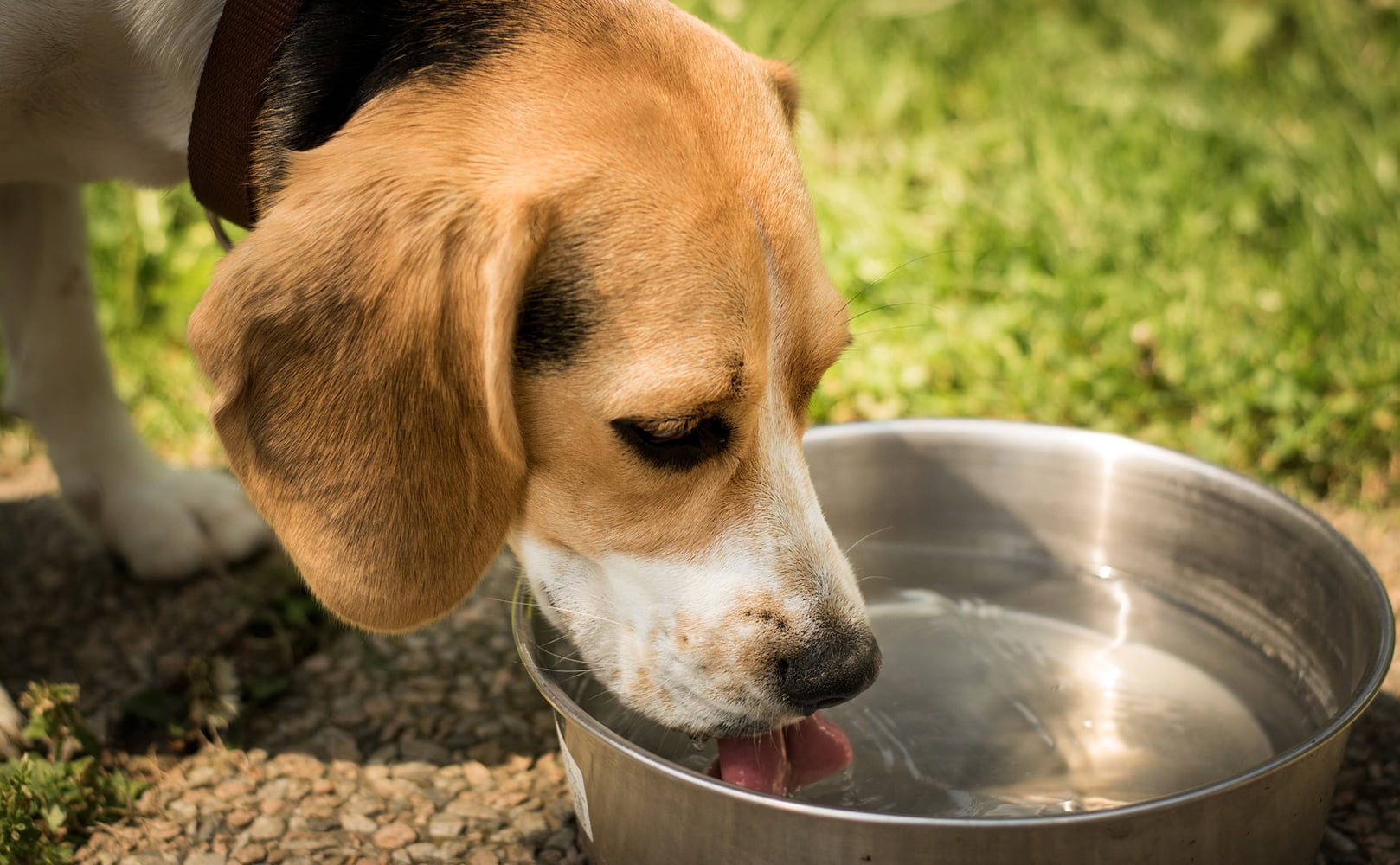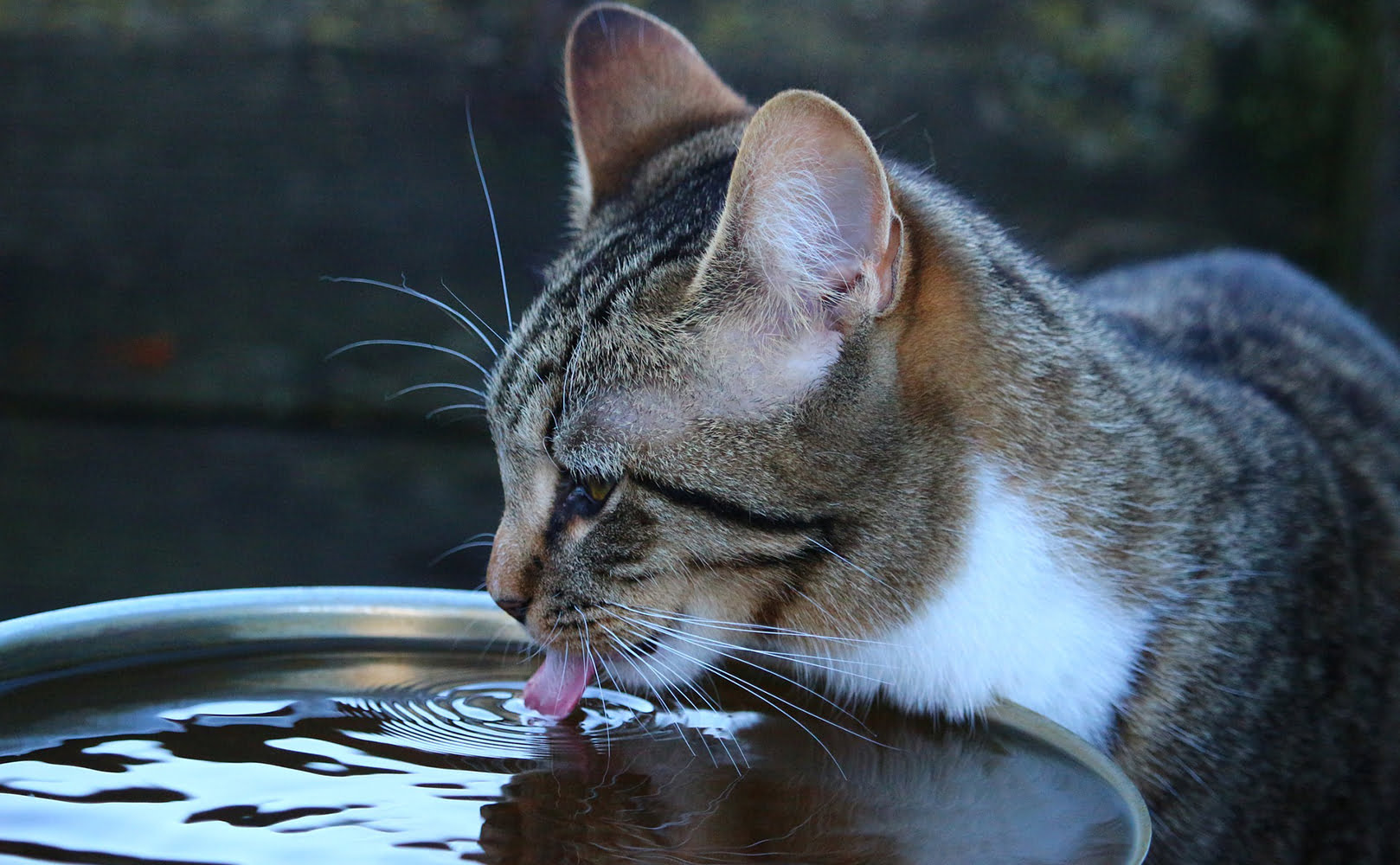What Is the Best Water for Cats and Dogs to Drink? #PetHealth
Written by: Gene Fitzgerald // Last Updated: Jan 4, 2023
This page may contain affiliate links. If you buy a product or service through such a link we earn a commission at no extra cost to you. Learn more.
Have you ever put much thought into what type of drinking water you should give your cat or dog? It is one of the most essential nutrients after all and, just like us, our pets drink water every single day of their lives.
If you haven’t, we will discuss the different drinking water sources including their potential health implications in this post.
Some of the information on this page is based on the personal opinions of pet owners. You should consult your vet before making any changes to your pet’s diet.
The Best Water for Dogs to Drink
As a general rule, the best water for dogs to drink is water that you would drink yourself. If your tap water is clean and healthy and therefore good enough for you, the same probably goes for your dog (and for your cat, of course).
Likewise, if your tap water is not safe but poses a health risk don’t give it to your little furry. Sure, most dogs could eat a pile of dirt and not get sick, but better safe than sorry.
On a side note: Your dog may not be drinking adequate amounts of water due to taste reasons. Some tap waters, for example, are high in chlorine content which creates an off-putting taste and odor.
Can Dogs Drink Tap Water?
Can dogs drink tap water? Yes, they can. But every tap water is different so it depends on where you live. For example, there might be chemicals like pesticides or herbicides in your water, or metals such as chromium 6. The age of the water system you are connected to and your home’s plumbing are important, too. Homes built before 1986 often have a lead problem due to pipes or solder containing the neurotoxin. Then there are factors like algae blooms in spring/summer if you get your water from a nearby lake.
You should also pay attention to water hardness which can cause urinary problems in dogs (learn more).
Bottom line: If you want to play it safe, have your tap water tested or check the annual water quality report for your utility.
Can Dogs Drink Well Water?
There is a whole arsenal of contaminants that can make well water unsuitable to drink, for dogs as well as humans. Again, if you want to play it safe, have your water tested.
And just like tap water, well water can be high in minerals which, like we said, has been linked with urinary problems in dogs (more info below).
Hard Water
Both tap and well water (and other waters) can contain high amounts of hardness minerals, usually calcium and magnesium. In theory, if your dog drinks hard water over an extended period of time, conditions like urinary tract and/or bladder infections, cystitis, urinary obstruction, crystalluria and stone formation might result.
The good news is that you can easily test for hard water. Kits are available online and at your local hardware store among many other places.
Also, research suggests that problems usually only occur with extremely hard water. Water with normal hardness levels is unlikely to cause issues. What’s more, female dogs suffer from urinary problems more often than male dogs.
Soft Water
A conventional water softener exchanges hardness in water, that is calcium and magnesium ions, with sodium (sometimes potassium) ions rendering the water soft. How much sodium will be added depends on how hard the water is in the first place.
Although the level is generally relatively low and not a big deal, the sodium concentration can be too high to be considered healthy for dogs to drink – especially if your vet has prescribed a low-sodium diet which is often the case for specific breeds, elderly canine and those with cardiovascular or kidney diseases. In addition, some pets just don’t like the somewhat salty taste of softened water.
The exceptions to the rule are water softeners not based on ion exchange to make hard water soft. These so called water conditioners work salt-free and therefore don’t increase sodium levels.
Filtered Water for Dogs
Doing your own filtering or buying filtered water, you can be rest assured that what your dog drinks day by day is indeed safe.
As for the best filtration method, there is reverse osmosis and distillation that provide almost pure H2O. RO and distilled water can be great to treat urinary problems but may not be suited for healthy dogs in the long run (learn more here).
Carbon filtration gets you rid of most chemicals, some heavy metals, and bad tastes and odors. Then there are specialized filter media like activate alumina for more persistent stuff – think fluoride and arsenic. And lastly, UV light treatment kills waterborne pathogens.
Which method is best for you depends on the condition of your water, and also on your preferences: Do you want filtered water everywhere in your home or just at a single faucet? Do you prefer a filter pitcher over and under sink system? How about a faucet filter? And are you on a budget?
If you want to go the filtered water route, find out what’s in your water first. Then get the best filter for the job.
Water Fountains
There are water fountains that use filters. This way your dog not only gets access to clean drinking water, he is also encouraged to drink more and stay well hydrated. Why? In general, pets – in fact almost all animals – prefer to drink moving over stagnant water. Just remember to replace the filter regularly.
As an alternative, you could also filter the water first and then pour it into a fountain.
Can Dogs Drink Distilled Water? How About Reverse Osmosis Water?
The benefit of distilled as well as RO water is that it’s almost pure H2O. No microorganisms, no chlorine, no lead, no pesticides – you name it! So this is good. However at the same time, both waters lack all the naturally occurring, healthy minerals. This can cause low electrolyte blood levels in your dog and also lead to over-hydration or water toxicity among other conditions. We also read a report about dogs developing heart problems due to potassium deficiency, presumably because they were given distilled water exclusively.
It might also be that your dog simply does not like the flat taste of distilled/RO water preventing proper hydration.
On the other hand, highly pure water can aid in the treatment of urinary problems like infections, crystals and stones.
Bottom line: Some veterinarians don’t recommend distilled or reverse osmosis water for dogs, others do.
The question really is, Does your dog get all the salts and minerals it needs from its food? If so, distilled/RO water might be just fine. And there is definitely no need to worry about giving small amounts here and there.
One may also ask, Why do you want to serve your dog distilled/RO water? If there is a certain contaminant that you are worried about, maybe there is a better way to have it removed.
In our humble opinion, unless your vet has specifically told you to use distilled/RO water, stay away from it. If you insist on using it, consider remineralization. This will allow you to bypass all the potentially harmful contaminants and still make sure that your dog gets all the salts and minerals it needs.
Bottled Water for Dogs
Dogs, cats, humans – drinking bottled water is always a waste of money. Most is just tap water anyway and there is no guarantee that it is any better in terms of quality. On top of that, it creates a lot of plastic waste.
The only reason for us to buy bottled water is if you are on the go and don’t have another choice.
Mineral Water for Dogs
As the name suggests, mineral water is high in minerals. The mineral content might be too high actually and thus cause urinary problems.
Also see: Hard Water
Can Dogs Drink Carbonated Water?
Giving a dog carbonated water can lead to gastric upset. If given too much, the dog’s stomach might flip a.k.a. bloat which is life-threatening. Bloating is especially a problem with dogs that can’t burp properly and larger breeds in general. Other reactions that dog owners reported are diarrhea and vomiting.
It’s not like your dog just farts a few times and no real harm will be done. Do NOT let your dog drink carbonated water!
Can Dogs Drink Smart Water or Vitamin Water?
Yes, they can. Smart Water is spring water mixed with electrolytes. And although dogs don’t need the extra dose of salts and minerals after physical activity as much as we do, if a dog has been vomiting or suffers from diarrhea electrolyte drinks can replace what was lost and help prevent dehydration.
By the way, an alternative to Smart Water is unflavored Pedialyte. Don’t use flavored Pedialyte or Gatorade as it contains artificial sugars.
As far as vitamin water is concerned, some vets say that it can improve your dog’s health, while others say it is unnecessary.
Stagnant Waters, Puddles, Ponds, Lakes, Pools, Toilet Water, Sea Water
- Most dogs don’t care about the “freshness” of water. In fact, they usually enjoy drinking out of puddles, ponds and god knows what. However, stagnant waters that lack circulation are prone to harbor large numbers of waterborne pathogens that can cause serious infections like leptospirosis or giardia. Infections can also come from water in locations highly frequented by dogs so that they contain their own feces, infections that can be severe and even lead to hospitalization.
- Another danger are puddles on or close to roads and parking lots as they might contain antifreeze. The chemical can cause irreversible kidney failure. Symptoms include vomiting, diarrhea, lethargy, and ultimately coma.
- Furthermore, ponds as well as lakes can see algae blooms in spring/summer releasing toxic substances into the water as soon as the algae start to wither. Ingesting such toxins can damage your dog’s kidneys, liver and other organs.
- Pool water can be hazardous if your dog drinks large amounts and over an extended period of time leading to dehydration due to the elevated chlorine content. The acute symptom is an upset stomach. One or two mouthfuls every now and then should not pose a problem though.
- How about toilet water? It likely contains cleaner residues like bleach and other chemicals – maybe not the healthiest choice as the primary drinking water source. Regular ingestion can result in irritation of the intestines and vomiting.
- Sea water is extremely high in salt content. If you want to protect your four-legged friend from diarrhea and dehydration, don’t let him drink it.
All in all, most dogs can drink water from questionable sources with no ill effect, so don’t worry too much. Just remember to watch for symptoms of illness and if you feel like there is something wrong consult a vet immediately.
The Best Water for Cats to Drink
As with dogs, the best drinking water for cats is water that would be healthy for yourself.
That being said, kittens on a wet-food diet get the bulk of their daily water intake through eating. So in this case you don’t have to worry about the water issue as much.
Still, remember that cats have a weak sense of thirst. And chronic underhydration can cause health problems, especially with the urinary tract. In other words, you have to make sure that your cat drinks enough water, even if not a whole lot is needed. A fountain can help you achieve that. Just like dogs, certain cats prefer drinking from a flowing water source. Some cats also like to drink straight from the tap. And generally speaking, cats always prefer water that tastes fresh.
Can Cats Drink Tap Water?
Cats can drink tap water if the quality is up to standards. You can learn more about tap water quality issues above.
In a nutshell:
Consider having your water tested or check your municipality’s water quality report. Your cat may also not like the water if it’s high in chlorine. Above that, we read a forum message where a cat owner reported that his two cats kept getting sick due to tap water being treated with chloramine for disinfection. And lastly, you should pay attention to water hardness which can cause urinary problems.
Well Water/Hard Water – Is It Safe?
Also see: Can Dogs Drink Well Water and Hard Water
It is interesting to note that cats are more prone to developing urinary issues than dogs when being given hard water.
Soft Water
Also see: Soft Water
Most cats can sustain themselves on salt water (sea water), so giving them soft water is unlikely to cause problems under normal circumstances. However, it could be the case that your feline does not like the taste much.
Filtered Water for Cats
Also see: Filtered Water for Dogs
RO and Distilled Water for Cats
Also see: Can Dogs Drink Distilled Water? How About Reverse Osmosis Water?
Can cats drink distilled water?
As for dogs, distilled water should only be the primary water source for your cat when recommended by your vet, for example in case of urinary crystals. Mineral intake gets restricted effectively preventing bladder stones from forming.
Other than that, you probably want to stay away from distilled water.
Can Cats Drink Bottled Water?
Can cats drink bottled water? It’s a waste of money, but they can.
Sparkling Water
Sparkling water is a big no-no. Too much carbonated water can lead to hiccups and stomach bloat.
Can Cats Drink Salt Water?
As mentioned earlier, most cats can sustain themselves on salt water. Some, however, drink too much of it and suffer from elevated blood salt levels.
Pool Water
When you consider that cats can survive on salt water, pool water should not pose a problem; unless there is more in it than chlorine alone.
Questions? Don’t hesitate to ask – just leave a comment below!
Information provided on BOS is for educational purposes only. The products and services we review may not be right for your individual circumstances.
We adhere to strict editorial guidelines. Rest assured, the opinions expressed have not been provided, reviewed, or otherwise endorsed by our partners – they are unbiased, independent, and the author’s alone. Our licensed experts fact-check all content for accuracy. It is accurate as of the date posted and to the best of our knowledge.





